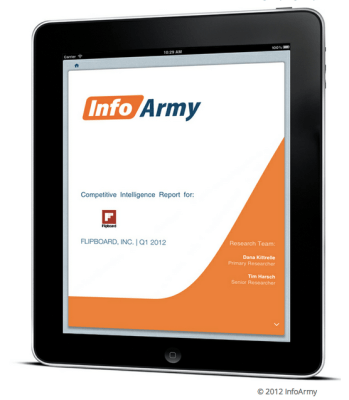Jim Fowler has already disrupted one industry by launching Jigsaw, the crowdsourced contact database that was acquired by Salesforce.com for $175 million (higher than initially reported thanks to earnouts). Now he’s hoping to do it again with a company called InfoArmy.
This time, Fowler’s looking at the competitive intelligence industry dominated by companies like Dun & Bradstreet, an industry that he says hasn’t seen any real innovation in ages. To change that, Fowler wants to build an army of researchers who can create reports for tens of thousands of companies (and eventually more than that).
Each report is created by two InfoArmy researchers — the primary researcher who does most of the initial legwork, plus a senior researcher, who will usually have higher standing on the site, and who double-checks and approves the work. Fowler says this army may come from the ranks of people who already do competitive intelligence research, but at the same time, the work should be doable by anyone who’s reasonably educated and intelligent.
Basically, when someone creates an InfoArmy report they’re filling out a big form with information like a company’s revenue, competitors, press coverage, and leadership team. In some cases, this information will be publicly available, while in others it can be extrapolated from public data.
For example, Fowler showed me some estimates for payment company Zuora’s revenue. Zuora is a private company, so it doesn’t release regular revenue numbers, but InfoArmy researchers took CEO Tien Tzuo’s statements about how many payments Zuora is processing, then used what they know about the company’s pricing, and about software-as-a-service business models, to make their estimate.
Fowler says this approach results in something that’s better than traditional competitive intelligence in a number of ways. For one thing (and this is a little ironic given the terminology), InfoArmy has data about the competition, so that you’re not just looking at a report about one company. Instead, you can also follow links to full reports about the companies that the one you’re reading about is taking on. Fowler says InfoArmy won’t publish a report until it’s linked to the report of at least one competing company. Another difference: InfoArmy reports are designed for quick browsing on the iPad.
“The days of reading a 25-page analyst report are gone,” he says.
InfoArmy reports will cost $99 each, and they will come as a year-long subscription — you get an initial report, but also the quarterly updates. Each payment is split between InfoArmy and the researchers, with 50 percent going to InfoArmy, 40 percent going to the primary researcher, and 10 percent going to the senior. When there are enough reports in the system, Fowler says he’ll probably add a subscription plan for unlimited reports. And if you don’t want to pay, you can also get access by signing up to be a researcher.
Fowler’s efforts have attracted some controversy in the past — perhaps most memorably with Michael Arrington called Jigsaw “evil”, a description he later revised to “amoral”. I’m don’t think anyone is going to react quite as intensely to the InfoArmy idea, but there will probably be plenty of complaints about individual reports, as companies say that this or that piece of information is wrong. It sounds like Fowler isn’t too bothered by the idea of criticism, but he notes that the reports include plenty of caveats about the fact that the financial estimates are just that — estimates.
And yes, companies can submit corrections. While Fowler says researchers should view those corrections skeptically unless they’re backed up by evidence, they will have an incentive to get things right. After all, if they or their report gets a bad reputation, they’re probably going to make less money from sales — and if things get bad enough, a certain company might get reassigned to a different researcher. Other researchers can also submit suggestions for a report, and if there’s a dispute, it will be adjudicated by judges, who are ranked even more highly on the site than senior researchers.
InfoArmy has raised $2 million in funding, including $1 million from Fowler.
